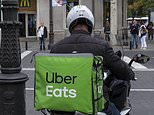Half of Britons say they have had trouble paying with cash in the last year
Half of Britons say they have had trouble paying with cash in the last year, according to new research Money Mail can reveal.
Analysis of figures from the Link network of ATMs shows a 22 per cent increase from 2023 in locations that did not accept or discouraged the use of cash in 2024.
The survey of 2,000 adults found car parks topped the list, with 21 per cent of respondents highlighting them as the least cash-friendly locations.
This was followed by cafes and restaurants (20 per cent) and public transport and pubs (both 10 per cent).
More than half of respondents (59 per cent) say it caused inconvenience, an increase from 48 per cent last year.
Cash usage has dwindled in the past decade as people increasingly use contactless and mobile payments.

Denied: Analysis of figures from the Link network of ATMs shows a 22% increase from 2023 in locations that did not accept or discouraged the use of cash in 2024
There are currently no regulations that require businesses to accept cash.
Last month, the Treasury Select Committee opened an inquiry calling for evidence to determine if new rules are needed to make cash acceptance mandatory across Britain.
It said cash remains a ‘vital resource to many’ and can be a ‘lifeline to groups such as those with long-term poor health or people at risk of economic abuse’.
Contactless payments remain the most popular payment choice, with 43 per cent of adults regularly using it, followed by 22 per cent who prefer mobile phone payments.
Graham Mott, director of strategy at Link, says: ‘Mandating cash acceptance in other countries has not always been successful and many businesses have already moved away from cash as demand has fallen.
‘However, there is still a huge reliance on cash alongside the growing risk of people being digitally excluded.
‘It is important that there is debate about how this issue is addressed.’














































